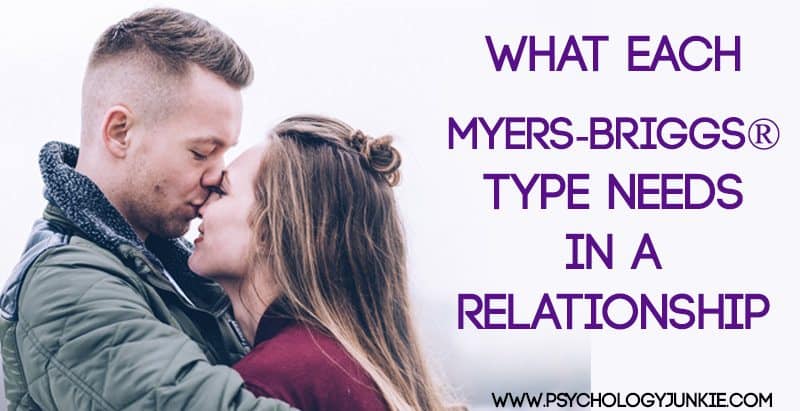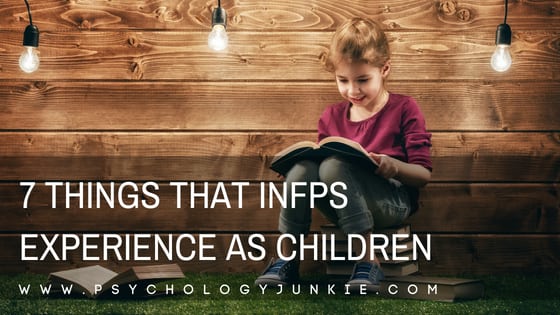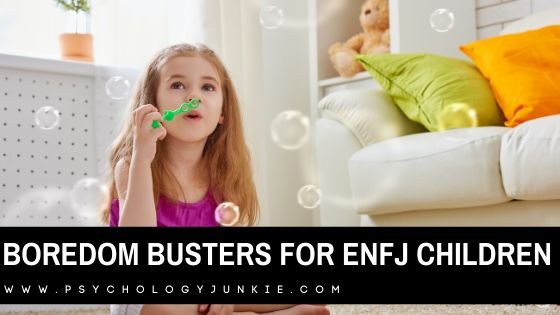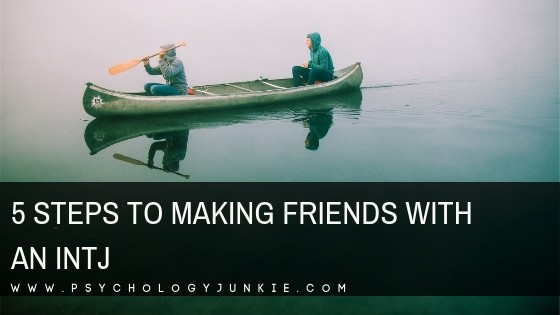What Each Myers-Briggs® Type Needs in a Relationship
Each Myers-Briggs® personality type has different needs and desires in a relationship. All types want trust, respect, and kindness of course. But there are certain values that are more important to some types than to others. Knowing the things that are important to your partner can help you to have a happier, more conflict-free relationship. If you’re not in a relationship, then knowing these tips can help you to see what matters to a potential partner and what things are less important.
Not sure what your personality type is? Take our new personality questionnaire here. Or you can take the official MBTI® here.

Table of contents
- What Each Myers-Briggs® Type Needs in a Relationship
- ISTJ Relationship Needs – Dedication and Honesty
- ISFJ Relationship Needs – Security and Attentiveness
- ESTJ Relationship Needs – Responsibility and Friendship
- ESFJ Relationship Needs – Companionship and Commitment
- ISTP Relationship Needs – Understanding and Independence
- ISFP Relationship Needs – Intimacy and Freedom
- ESTP Relationship Needs – Experience and Enthusiasm
- ESFP Relationship Needs – Adventure and Authenticity
- INTJ Relationship Needs – Common-Sense and Curiosity
- INFJ Relationship Needs – Understanding and Aspiration
- ENTJ Relationship Needs – Respect and Intellectual Stimulation
- ENFJ Relationship Needs – Empathy and Connection
- INTP Relationship Needs – Independence and Attentiveness
- INFP Relationship Needs – Sincerity and Shared Values
- ENTP Relationship Needs – Imagination and Fun
- ENFP Relationship Needs – Encouragement and Open-Mindedness
- What Do You Think?
Estimated reading time: 17 minutes
What Each Myers-Briggs® Type Needs in a Relationship
ISTJ Relationship Needs – Dedication and Honesty
ISTJs are hard-working, responsible individuals who take their commitments very seriously. They’re usually not looking for one-night stands, flings, or low-key commitments. This doesn’t mean they’re going to offer you a wedding ring on the first date! But it does mean they’re not interested in the superficial. They want to know that their partner is there for them, point-blank. They want to know that they can count on them to keep their word and follow through on their commitments. They also want mutual support and a partner who takes the time to truly listen to them. ISTJs are often very intellectual individuals, but they tend to be private. They may not share all their interests and ideas right away, but with time and trust, they enjoy having in-depth discussions about anything from technology to politics to psychology, and more.
Relationship Do’s:
– Follow through on your word.
– Be loyal.
– Be honest.
– Listen attentively.
– Stick with the plan.
– Help out with practical daily needs.
– Be respectful of their things.
Relationship Don’ts:
– Don’t push them to socialize too much.
– Don’t push them to discuss their feelings early on in the relationship. Let them decide when they’re ready.
– Don’t talk down to them.
– Don’t leave their house a mess.
– Don’t show up late for dates or engagements.
– Don’t be emotionally over-reactive. Try to discuss your feelings calmly.
– Don’t be wishy-washy.
Related: The Leadership Skills of Every Myers-Briggs® Personality Type
ISFJ Relationship Needs – Security and Attentiveness
ISFJs are generous, devoted individuals who take their relationships very seriously. They are very compassionate people who want to make a difference in their families and communities. They want a partner who shares their values and also cares about the community they live in. They want to know that this relationship has the strength to last and long-term security. Another desire ISFJs have is to find someone who will truly listen to them. They tend to be private people and hope to find someone who will “break them out of their shell”. These “nice guys/girls” have a lot of interests and passions that they’re waiting to share with the right person!
Relationship Do’s:
– Follow through on your word.
– Be loyal.
– Be polite.
– Listen attentively.
– Show empathy and understanding.
– Help out with practical daily needs.
– Be respectful of their things.
– Acknowledge and appreciate the kind things they do.
Relationship Don’ts:
– Don’t push them to socialize too much.
– Don’t disrespect their values.
– Don’t talk down to them.
– Don’t leave their house a mess.
– Don’t show up late for dates or engagements.
– Don’t put down other people.
– Don’t yell or get hostile.
Related: 10 Things You Should Never Say to an ISFJ
ESTJ Relationship Needs – Responsibility and Friendship
ESTJs are hard-working, committed individuals who hope to find someone with the same determination and staying power that they have. They aren’t usually interested in casual encounters or low-key relationships; they want something that’s actually going to last and be secure. They want to know that they can count on their partner to follow through on commitments and plans. They want to know that when their partner says “I love you” they mean it and that it’s not just a fleeting emotional reaction. They want to know they can trust their partner. Wishy-washy behavior will quickly deter them from a relationship. They want their partner to stick to their promises, and show a commitment to bettering the world around them. They also want a companion who can laugh with them and be a true friend.
Relationship Do’s:
– Follow through on your word.
– Be loyal.
– Be honest.
– Be polite.
– Be willing to help out with practical daily needs.
– Be hard-working.
– Be responsible.
Relationship Don’ts:
– Don’t make a mess of their house.
– Don’t push them to discuss their feelings early on in the relationship. Let them decide when they’re ready.
– Don’t be emotionally over-reactive. Try to discuss your feelings calmly.
– Don’t disrespect rules.
– Don’t show up late for dates or engagements.
– Don’t be unwilling to socialize or go out with their friends and family members.
Related: How to Communicate Effectively with any Myers-Briggs® Personality Type
ESFJ Relationship Needs – Companionship and Commitment
ESFJs are generous, friendly-natured individuals who will go to great lengths to make their partners happy. Like the other Introverted-Sensing (SJ) types, ESFJs value commitment and security. They want to know that their partners are with them for the long haul. They also deeply desire companionship and mutual support. They want to look forward to fun activities with their partner; whether it’s going to a play or attending a party with their friends. The ESFJ sees their partner as their potential “best friend”; someone who is going to be with them till the end, devoted, honest, and faithful. The ESFJ, in return, will provide positive experiences, generosity, and selfless commitment.
Relationship Do’s:
– Follow through on your word.
– Be polite.
– Show consideration for others.
– Show empathy and understanding.
– Share your thoughts and feelings.
– Be respectful of their things.
Relationship Don’ts:
– Don’t ignore their need for socializing and communication.
– Don’t disrespect their values.
– Don’t talk down to them.
– Don’t leave their house a mess.
– Don’t show up late for dates or engagements.
– Don’t belittle their emotions and feelings.
Related: Understanding ESFJ Feeling
ISTP Relationship Needs – Understanding and Independence
ISTPs are extremely independent and resourceful individuals who want real friendship and trust in their relationships. They need a partner who understands that their need for space doesn’t mean they don’t care, it just means that they require alone time to gain energy and process information. If there’s something that ISTPs hate, it’s being pressured to conform to someone else’s lifestyle and timeline. They need a partner who accepts their independence but also enjoys the support, fun, and humor they give. ISTPs can be very faithful, generous, open-minded individuals; they just need a partner who can see that and acknowledge it even when they are needing some time alone.
Relationship Do’s:
– See things from a realistic perspective.
– Give them plenty of space.
– Know how to laugh about things.
– Be up for adventure.
– Be loyal.
– Be honest.
Relationship Don’ts:
– Don’t push them to socialize too much.
– Don’t be emotionally over-reactive. Try to discuss your feelings calmly and in a straightforward way.
– Don’t talk down to them.
– Don’t be passive aggressive.
– Don’t be controlling.
Related: The Top 25 Favorite ISTP Movies
ISFP Relationship Needs – Intimacy and Freedom
ISFPs are extremely sincere, compassionate, and free-spirited individuals. These generous souls need a partner who will appreciate their gentle nature, their creativity, and their hands-on approach to life. ISFPs want to be with someone who will truly listen and try to understand their deep emotions and values. They also want someone who won’t stifle them or force them to conform to a pre-ordained image of how a partner is “supposed” to be. ISFPs need alone time, and they also need adventure and experience. They will quickly tire of a partner who talks down to them, makes them feel caged in, or doesn’t listen to their thoughts and feelings. A realistic, fun-loving, attentive partner is the ideal for this type.
Relationship Do’s:
– Be honest at all times.
– Give them space.
– Know how to laugh about things.
– Be up for adventure.
– Be open-minded.
– Be willing to think outside the box.
– Show empathy and understanding.
Relationship Don’ts:
– Don’t push them to socialize too much.
– Don’t belittle their emotions and feelings.
– Don’t talk down to them.
– Don’t be passive aggressive.
– Don’t be controlling.
– Don’t yell when you’re angry.
Related: 10 Surprising Truths About ISFPs
ESTP Relationship Needs – Experience and Enthusiasm
ESTPs are fun-loving, optimistic, and quick-witted. These types want a partner who can keep up with their adventurous ways and doesn’t try to cage them in. Although they have a reputation for hating commitment, most ESTPs can be incredibly loyal when they finally do fall for someone. They’re not afraid of challenges and won’t run away when things get tough. They want a partner who believes in them, encourages them, and admires their abilities. They also want a partner who enjoys a good time, knows how to see the bright side, and who is open-minded to new opportunities and escapades. Life is rarely boring with an ESTP mate, so enjoy the ride!
Relationship Do’s:
– See things from a realistic perspective.
– Know how to laugh about life.
– Be up for adventure.
– Show appreciation for their perspective.
– Be willing to be spontaneous.
– Compliment them.
Relationship Don’ts:
– Don’t try to control them.
– Don’t be emotionally over-reactive. Try to discuss your feelings calmly and in a straightforward way.
– Don’t talk down to them.
– Don’t pressure them to make long-term decisions quickly.
– Don’t take yourself (or life) too seriously.
– Don’t give them the “silent treatment”. Talk to them about what’s bothering you.
– Don’t be unwilling to try new things.
Related: Discover Your Superpower – Based on Your Myers-Briggs® Personality Type
ESFP Relationship Needs – Adventure and Authenticity
ESFPs are known for their lively, optimistic, and generous nature. These types want to experience all that the world has to offer, and they want a partner who can join them for the adventure! Whether it’s hiking through the Himalayas or exploring their hometown’s local cuisine, ESFPs know how to explore and enjoy every sight, sound, taste, and texture. They want a partner who appreciates their enthusiasm, and a partner who has compassion. ESFPs will quickly tire of a partner who is dishonest, manipulative, or controlling. They also want a partner who doesn’t mistake their gregarious zest for life as “flightiness”. ESFPs are realists who are often incredibly knowledgeable and capable people.
Relationship Do’s:
– Know how to laugh.
– Be up for adventure.
– Enjoy the moment.
– Show empathy and compassion.
– Be willing to be spontaneous.
– Compliment them.
– Tell the truth.
Relationship Don’ts:
– Don’t try to control them.
– Don’t pressure them to make long-term decisions quickly.
– Don’t talk down to them.
– Don’t take yourself (or life) too seriously.
– Don’t be passive aggressive.
– Don’t be unwilling to try new things.
Related: Understanding ESFP Sensing
INTJ Relationship Needs – Common-Sense and Curiosity
INTJs are known for their logical nature, big-picture vision, and independence. These types want a partner who is ready to have deep discussions, and explore innovative ideas and theories in-depth. They want someone who seeks personal growth and intellectual stimulation as much as they do. While INTJs can be extremely caring, they tend to have a difficult time expressing their emotions. They need a partner who can have a straightforward discussion without playing emotional mind-games. Manipulation almost never works on an INTJ; they seem to sniff it out right away and it instantly turns them off. They want a partner who is honest with them, who appreciates their advice, and who seeks to broaden their mind every day. INTJs take their relationships very seriously and are usually not interested in casual flings or low-key relationships. There are always exceptions to this rule, of course, but INTJs usually don’t pursue a relationship unless they’ve given it a great amount of thought and consideration.
Relationship Do’s:
– Follow through on your word.
– Be loyal.
– Be honest.
– Listen attentively.
– Show interest in intellectual pursuits.
– Help out with practical daily needs.
– Be respectful of their space.
Relationship Don’ts:
– Don’t push them to socialize too much.
– Don’t push them to discuss their feelings early on in the relationship. Let them decide when they’re ready.
– Don’t be passive-aggressive.
– Don’t show up late for dates or engagements.
– Don’t be emotionally over-reactive. Try to discuss your feelings calmly.
– Don’t ever try to manipulate them.
Related: 12 Stress-Busting Techniques for INTJs
INFJ Relationship Needs – Understanding and Aspiration
INFJs are known for their empathy, insight, and originality. To most casual acquaintances they will seem friendly and soft-spoken, but there’s more to this type than smiles and kind words. They want a partner who has vision, who is curious about the future, who doesn’t discount their insights, and who really listens. INFJs often feel misunderstood or disconnected from other people because they aren’t usually able to share their insights without being met with skepticism. A partner who takes the time to truly get to know them, to join them in their efforts, and to trust their hunches will be greatly appreciated. INFJs are not usually interested in casual relationships or flings; they don’t really see the point in getting into a relationship unless they feel a truly deep connection. Obviously, there are varieties within a type; but more often than not, INFJs are interested in serious relationships.
Relationship Do’s:
– Show empathy and understanding.
– Be loyal.
– Be honest.
– Listen attentively.
– Show interest in intellectual pursuits.
– Be ready for deep discussions.
– Have respect for their space and alone time.
– Be polite.
Relationship Don’ts:
– Don’t push them to socialize too much.
– Don’t pressure them to focus entirely on the moment.
– Don’t be passive-aggressive.
– Don’t yell
– Don’t put down other people.
– Don’t dismiss their insights.
– Don’t talk down to them.
Want a comprehensive guide to the INFJ personality type? Check out my eBook, The INFJ – Understanding the Mystic.
Related: 10 Things You Should Never Say to an INFJ
ENTJ Relationship Needs – Respect and Intellectual Stimulation
ENTJs are confident, decisive, logical individuals who look for a partner that truly believes in them. They want a relationship where they can spend date nights talking about theories, the future, goals, and plans. They want a partner who will ask them questions and come to them for advice. A partner who trusts that they know what they’re doing and doesn’t belittle or try to control them. They also want a partner who is hard-working and sticks to their commitments. Laziness, complaining, and emotional over-reactions are a sure way to ruin a relationship with an ENTJ. They want a partner who is willing to stick with them through thick and thin and won’t retreat whenever there’s a challenge.
Relationship Do’s:
– Follow through on your word.
– Be loyal.
– Be honest.
– Be hard-working.
– Show interest in intellectual pursuits.
– Help out with practical daily needs.
– Be forthcoming about your needs.
– Show that you have goals and ambitions.
Relationship Don’ts:
– Don’t ignore their need for socializing.
– Don’t push them to discuss their feelings early on in the relationship. Let them decide when they’re ready.
– Don’t be passive-aggressive.
– Don’t show up late for dates or engagements.
– Don’t be emotionally over-reactive. Try to discuss your feelings calmly.
– Don’t try to manipulate them.
– Don’t be controlling.
Related: 10 Things You Should Never Say to an ENTJ
ENFJ Relationship Needs – Empathy and Connection
ENFJs are exuberant, empathetic, and goal-oriented individuals. They want a relationship where they feel appreciated, understood, and inspired to achieve their goals. They want to know that they can express their emotions freely and not be met with condescension or repression. They will quickly tire of partners who try to stifle their deep feelings or who have no ambition or vision for the future. They want to be with someone who wants to make a big difference in the world around them, someone who cares about people and is willing to work hard to help others. They want to enjoy a blend of intellectual discussion and time out socializing with good friends and family members. ENFJs usually desire committed relationships and are not often fond of casual relationships or flings.
Relationship Do’s:
– Show empathy and understanding.
– Be loyal.
– Be honest.
– Listen attentively.
– Appreciate their kindness and empathy
– Be ready for deep discussions.
– Give plenty of verbal affirmation for what they do well
– Be polite.
Relationship Don’ts:
– Don’t misinterpret their friendliness as phoniness
– Don’t put down other people around them.
– Don’t give them the silent treatment.
– Don’t yell
– Don’t ignore their need for socializing and communication.
– Don’t instigate conflict situations.
Related: 10 Things You Should Never Say to an ENFJ
INTP Relationship Needs – Independence and Attentiveness
INTPs are known for being private, analytical, and innovative individuals. They seek a relationship where they can have the freedom to pursue their many ideas but also share warmth, loyalty, and friendship. They want to feel understood and appreciated for their ingenuity, and they also want a partner who has an open mind and can explore numerous intellectual topics with them. INTPs aren’t naturally tuned into the emotions of other people and may get frustrated in relationships where their partner expects them to just “know” how they feel. They may quickly lose interest if their partner is extremely reactive emotionally or tries to make them conform to a rigid structure or traditional set of expectations. INTPs like to think outside the box, and they enjoy a partner who can do that with them.
Relationship Do’s:
– Be willing to think outside the box.
– Be loyal.
– Be honest.
– Listen attentively.
– Show interest in intellectual pursuits.
– Be curious.
– Be respectful of their space.
Relationship Don’ts:
– Don’t push them to socialize too much.
– Don’t push them to discuss their feelings early on in the relationship. Let them decide when they’re ready.
– Don’t be passive-aggressive.
– Don’t try to control them.
– Don’t be emotionally over-reactive. Try to discuss your feelings calmly.
– Don’t try to manipulate them.
Related: 10 Things You Should Never Say to an INTP
INFP Relationship Needs – Sincerity and Shared Values
INFPs are known for being compassionate, imaginative, and authentic. They seek a relationship where they can be a “team” with their partner and pursue causes they both believe in. As strong introverts, they need plenty of quiet time to pursue their own creative interests, but they also desire a partner who can come alongside and share ideas and alternate perspectives with them. INFPs are very private individuals, but in a relationship, they want someone with whom they can share their deepest thoughts and feelings. They want to know their partner intimately; honesty is one of the biggest attractors to an INFP. They have a very low tolerance for manipulation, bullying, or close-mindedness.
Relationship Do’s:
– Show empathy and understanding.
– Be honest and sincere.
– Listen attentively.
– Be imaginative.
– Be ready for deep discussions.
– Have respect for their space and alone time.
– Respect their values.
Relationship Don’ts:
– Don’t push them to socialize too much.
– Don’t belittle their emotions.
– Don’t be passive-aggressive.
– Don’t yell
– Don’t put down other people.
– Don’t put down their ideas.
Related: 10 Surprising Truths About INFPs
ENTP Relationship Needs – Imagination and Fun
ENTPs are known for being energetic, innovative, and analytical. These individuals want to explore a vast world of concepts and ideas with their partner. They want to question the status quo, defy the norm, and explore the potential of hundreds of possibilities. They enjoy a good debate and need a partner who can handle getting to the core of an idea, even if it means being willing to think outside of traditional rules and boundaries. ENTPs will quickly tire of a relationship where they are forced to do everything “by-the-book” or their innovative thinking is stifled. They want to share fun, creative experiences with their partner and to them, this means being willing to take some risks and push some limits.
Relationship Do’s:
– Be willing to think outside the box.
– Be loyal.
– Be able to laugh about life.
– Listen attentively.
– Show interest in intellectual pursuits.
– Be curious.
– Be willing to be spontaneous.
Relationship Don’ts:
– Don’t give them the silent treatment.
– Don’t be passive-aggressive.
– Don’t try to control them.
– Don’t be emotionally over-reactive. Try to discuss your feelings calmly.
– Don’t try to make them conform to your traditions.
– Don’t expect them to do something because “it’s the way it’s always been done”.
ENFP Relationship Needs – Encouragement and Open-Mindedness
ENFPs are known for being imaginative, compassionate, and insatiably curious. They seek a relationship where they can explore a vast realm of possibilities with their partner. They want to discuss the nature of reality, question pre-established rules and traditions, and find innovative ways to improve the world for others. ENFPs want to be inspired and given encouragement in their many dreams and endeavors. Life is full of exciting possibilities and they want a partner who can join them for the ride. ENFPs can be private about their deepest emotions, but they want a partner who can really listen to their values and try to understand them. They are quick to notice manipulative behavior, so lying is a major no-no in this relationship.
Relationship Do’s:
– Be willing to think outside the box.
– Be loyal.
– Be able to laugh about life.
– Listen attentively.
– Show empathy and consideration.
– Be curious.
– Be willing to be spontaneous.
– Be honest.
Relationship Don’ts:
– Don’t give them the silent treatment.
– Don’t be passive-aggressive.
– Don’t try to control them.
– Don’t talk down to them.
– Don’t try to make them conform to your traditions.
– Don’t expect them to do something because “it’s the way it’s always been done”.
– Don’t yell.
– Don’t talk badly about others.
What Do You Think?
Do you agree with this article? Do you have any thoughts to add? Let us know in the comments!
Find out more about your personality type in our eBooks, Discovering You: Unlocking the Power of Personality Type or The INFJ – Understanding the Mystic. You can also connect with me via Facebook, Instagram, or Twitter!












I would add for the ENFP it is important to provide the ENFP the behavior/material necessary to envision a bright future. The ENFP may be willing to compromise aspects of that future reality but he/she must be satisfied with the potential future the partner has to offer. Maybe it can be better said, but as an ENFP, my vision of future possibilities seems very real and very present to me and if the outlook isn’t good, then it can be very disturbing.
ENTP’s are not LOYAL, at all. So why do they deserve to have loyal friends/ partners?
Um, screw you?
ENFPs are known for being imaginative, compassionate, and curious. ENFP seek a relationship where they can explore a large number of possibilities with their partner.